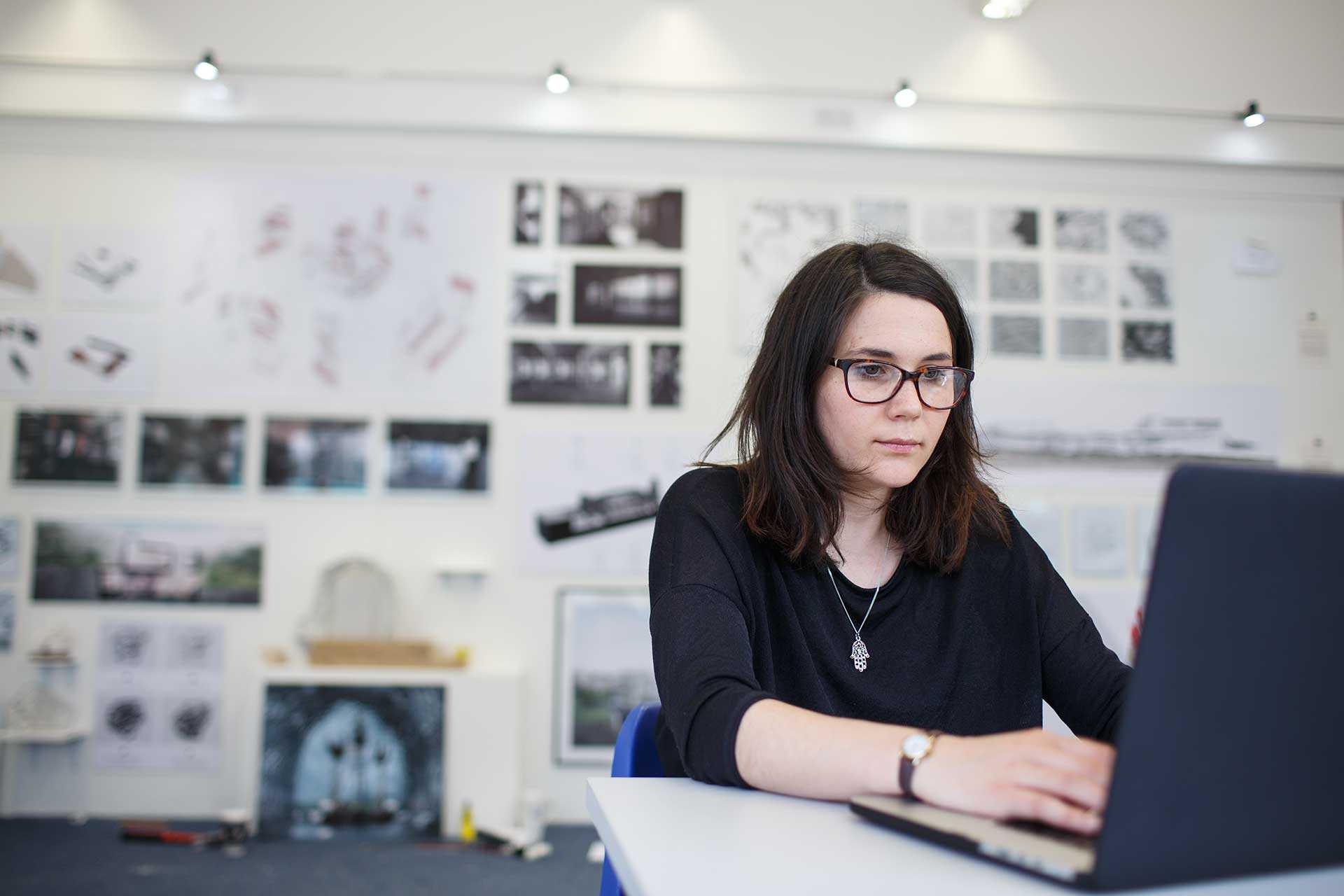Architecture
Develop your unique approach to design and take the next step to becoming a registered architect.

This is a Royal Institute of British Architects qualification. Building on your undergraduate learning, the course deepens your knowledge of key areas such as design thinking, urban analysis, theoretical complexity, professional expertise and historical knowledge.
You'll benefit from studying and working in our unique and spacious design studios, located at the heart of the University campus. Our programme advances collaboration and interdisciplinary opportunities and enables you to develop skills and knowledge through design events, cross-school collaborative learning, seminars and lectures, and sustainability-led tech and environmental design workshops.
Kent’s MArch architecture programme is accredited by the Architects Registration Board (ARB) and validated by the Royal Institute of British Architects (RIBA).
The following modules are what students typically study, but this may change year to year in response to new developments and innovations.
Compulsory modules currently include the following
The RIBA and ARB consider competencies in urban design essential skills for the development of architects and the architectural profession (MArch/ Part 2 ARB Criteria 2024). In this module students develop design thinking in relation to broader urban contexts, reflecting on issues that impact the development of successful urban spaces, networks, identities, social needs and values and environments. Orientated towards the analysis of urban spaces, and engaging with theories, precedent and practices of historical and contemporary urban design in diverse contexts, the module asks students to reflect on these current practices through their studio design projects. Within specialist design units, students will be guided through weekly lectures to develop holistic social and environmental analysis and design proposals, which address identified urban needs and enhance the performance of existing urban contexts. Working in response to real-world scenarios, students will be required to develop speculative, reasoned and evidenced design proposals which contextualise and advance current practices in response to thoughtful, robust analysis of social needs and governance/ policy objectives in relation to planning policies, professional standards and regulatory frameworks.
This module forms the first part of a three-part curriculum on architectural design, delivered across three terms. In the following design modules, students will build on their urban design work through site-specific social engagement, design interventions and larger-scale architectural design proposals, maintaining and developing deeper and more detailed design thinking on the relationships between urban, architectural and detailed design.
Compulsory modules currently include the following
A minimum of a second class honours degree in architecture - with a demonstrated strength in design portfolio - from a UK university, or an overseas qualification with a grade or GPA of an equivalent standard.
Applicants will be asked to submit a portfolio of their design work once their application has been received. Although it is not a requirement, professional work experience taken after completing your undergraduate degree is also expected.
The University will consider applications from students with a wide range of qualifications. Prospective applicants with alternative qualifications should contact information@kent.ac.uk for advice prior to application. Note that it is not possible to offer places to all students who meet our typical offer/minimum requirement.
All students graduating from the MArch programme receive their award with ARB and RIBA Part 2 exemption. Further information is available from the Architects Registration Board (ARB).
*The Government announced on 26 November 2025 that tuition fees in England for Home students will increase to £9,790 from £9,535 for the academic year 2026/27. This increase requires Parliamentary approval, which is expected to be given in early/mid 2026.
Tuition fees may be increased in the second and subsequent years of your course. Detailed information on possible future increases in tuition fees is contained in the Tuition Fees Increase Policy.
The University will assess your fee status as part of the application process. If you are uncertain about your fee status you may wish to seek advice from UKCISA before applying.
For details of when and how to pay fees and charges, please see our Student Finance Guide.
Students will need to provide the material necessary to produce hand-drawn and printed computer drawings/ images, documents, reports and written works. Students will need to provide the material necessary to produce physical models, either by hand or using available 3D printing and/ or laser cutting machines.
Site visits are essential, and students will need to cover transport costs (local distances only), which will vary, depending on module site location. Some modules may entail visiting public archives and libraries, requiring regional or national travel and entrance fees.
Annual fieldtrips will be offered during the programme, and students are strongly encouraged to join these and will need to cover the costs of travel, accommodation and subsistence.
Find out more about accommodation and living costs, plus general additional costs that you may pay when studying at Kent.
Kent offers generous financial support schemes to assist eligible undergraduate students during their studies. See our funding page for more details.

As a Kent graduate, you can go on to successful careers in architecture and the wider creative industries. Your imaginative and creative skills in analysis, engagement and design thinking, will give you the capacity to work in a diverse and varied range of industries, disciplines and roles, so you can effect change in the places you want to see it.
Qualifying as a professional architect involves a specific route of study and work experience.
Many of our graduates go on to work in well-known architectural practices. Our graduates have also followed careers in professions related to design, graphics and visualisation.
Graduates entering high-skill roles can earn up to
A degree can boost average lifetime earnings by over
Our application system (Kent Vision) allows you to save and return to your application at any time.


